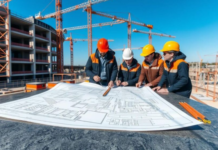Embarking on a residential construction project is both exciting and daunting. Whether you’re building your dream home from the ground up or adding an extension, careful planning is essential to ensure the process goes smoothly.
This guide will walk you through some essential tips to help you plan effectively, so you can enjoy the construction journey without unnecessary stress.
1. Define Your Vision and Budget
Before you start any construction project, it’s crucial to have a clear vision of what you want to achieve. Take the time to think about your needs and desires. Do you want a modern look or something more traditional? Are you dreaming of a spacious pole barn for your outdoor equipment? Having a well-defined vision will guide every decision you make along the way.
Once you have your vision, it’s time to set a budget. Your budget should cover all aspects of the project, including materials, labor, permits, and unexpected expenses.
2. Choose the Right Team
Selecting the right team of professionals is key to a successful construction project. You’ll need to hire an architect, contractor, and possibly other specialists depending on the complexity of your project. Take the time to research and interview potential candidates.
Look for professionals with experience in residential construction, strong references, and a clear understanding of your vision.
3. Obtain Necessary Permits and Approvals
Before breaking ground, make sure you have all the necessary permits and approvals from your local government. This step is often overlooked, but it’s essential to avoid legal issues and potential fines down the road.
The types of permits you’ll need can vary depending on the scope of your project and your location. Your contractor or architect should be able to guide you through the permitting process, but it’s important to stay involved and make sure everything is in order.
4. Plan for Excavation and Site Preparation
Excavation is a critical step in any construction project, especially if you’re building a new home or adding an extension. Proper site preparation ensures that your foundation is stable and that the land is suitable for construction. Depending on your project, this might involve leveling the ground, removing trees, or digging trenches for utilities.
Discuss the excavation process with your contractor early on to understand what’s involved and how it will impact your timeline and budget. Proper planning at this stage can prevent issues later in the construction process and ensure that your project starts off on solid ground.
5. Prepare for the Unexpected
Even with the best planning, construction projects rarely go exactly as planned. Weather delays, supply shortages, and unforeseen issues can all impact your timeline and budget. The key is to be flexible and prepared for the unexpected. Build some buffer time into your schedule and keep an open line of communication with your team.
If challenges arise, address them calmly and work with your contractor to find solutions. Staying patient and adaptable will help you navigate any bumps in the road and keep your project moving forward.
Conclusion
Planning a residential construction project requires careful consideration and attention to detail. By defining your vision and budget, choosing the right team, obtaining necessary permits, planning for excavation, selecting quality materials, and preparing for the unexpected, you can set the stage for a successful and rewarding construction experience.
With thoughtful planning, your dream home will soon become a reality.




